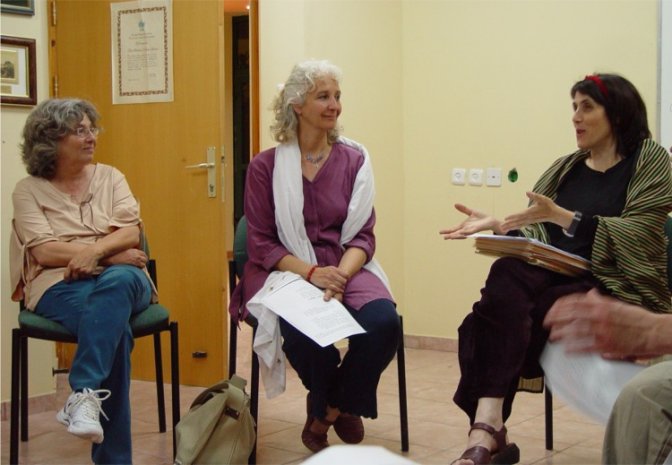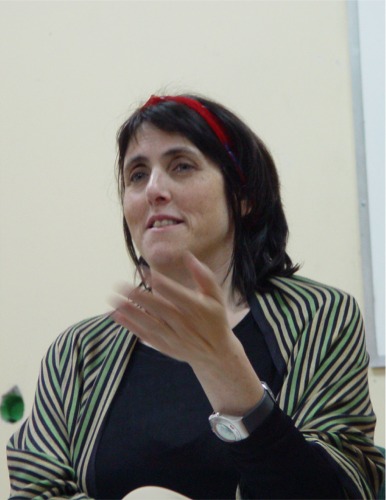Home > Oasis of Peace > Projects & Outreach > Doumia-Sakinah: The Pluralistic Spiritual Centre > Radical social views in the traditional Passover Hagadah
Radical social views in the traditional Passover Hagadah
A lecture by Rabbi Einat Ramon
Monday 18 April 2005
All the versions of this article: [English] [עברית]

One week before the Passover holiday, Doumia Sakinah arranged a study evening in the framework of the series, “Tradition, culture, society and commentary” with Rabbi Dr. Einat Ramon.
Ramon is the first Israeli-born woman to be ordained as a rabbi. She has led a congregation in the USA and been a spokesperson for the movement for Conservative Judaism in Israel. Today she lectures in Jewish Thought in in the academic track "Women and Judaism" at the Schechter Institute of Jewish Studies, Jerusalem. She has authored a dissertation, God, The Mother: A Critique of Domination in the Religious Zionist Thought of A.D. Gordon (1856-1922), published by Stanford University (1999).
The evening was attended by Jewish, Moslem and Christian members of NSWAS and a number of guests. The discussion dealt with the history of the Passover tradition and historical influences upon its development. Rabbi Ramon explained that the commemoration of Passover became a religious ceremony with a structured liturgy only after the destruction of the Temple in Jerusalem. The ceremony’s origin, from the Biblical period, is a religious ceremony of sacrifice.
In the Passover Seder or ceremony that has come down to us, still to be found are pagan influences, such as the cleaning of the house of all wheat and barley from the past year, and Hellenistic influences, such as discussion of philosophical issues during the meal, the textual reference to a side-reclining position for eating and drinking, and the afikomen, from a Greek word signifying dessert.
Since one of the aims of the Passover Seder is to transmit the story of the exodus from Egypt to children, it has various activities that are intended to capture their interest, as well as that of the adults.
The content of the Seder relates to the history of the people of Israel. It particularly emphases Jewish suffering: the Jews appear as victims of persecution at the hands of gentiles. The definition of the essence of Jewish experience as persecution has awakened many questions, especially by secular and reform Jews in the last two hundred years.
Due to the presence in the Seder of pagan elements relating to nature, and of content that lends itself to secular interpretation, even atheistic Jewish groups have liked to interpret the ceremony and the Haggadah and to find in the holiday a meaning that speaks to their hearts and social beliefs.
Since the Passover story deals with the rebellion of slaves, various groups have found support for their ideology or struggle. Among these have been socialists, feminists and the kibbutz movement, all of which have constructed Haggadahs of their own, to be read on the Passover evening. These groups also adopt the Passover ceremony as an opportunity to transfer to the next generation their educational and ideological messages.
Sometimes passages are changed or eliminated because a particular group will find them to be unsuitable. Rabbi Ramon brought for our consideration the passage:
"Pour out your wrath upon the gentiles that acknowledge you not, and upon the nations that call not upon your Name, for they have devoured Ya`aqov, and laid waste to his habitation"
[Psalm 79] "Pour out your indignation upon them, and let the fierceness of your anger overtake them.”
Rabbi Ramon pointed out that people involved in peace activities often prefer to change this passage, whereas others opt to leave it only in part. She ventured her own opinion that the passage should be left intact, if only for its ability to strengthen the resolve of those who suffer injustice. In support, she mentioned how this same passage had been found inscribed on the walls of the gas chambers in Nazi Germany.
In the final part of the discussion, we looked at the Feminist Haggadah published by the Yalta Group, which is made up of female rabbis and rabbinical students of the Conservative movement. Its editor, Rabbi Edith Lev writes, “the Feminist Haggadah is a quest for new meanings in the ancient text, besides the addition of new texts. It is a search for the statement of the modern Israeli woman”. For example, where the traditional Haggadah mentions four male children bearing specific qualities, the Feminist Haggadah mentions four female children named: “Wisdom of the Heart”, “Rebellious”, “Innocent” and “Unable to ask”. Each of these expresses the release from slavery to freedom in the national and human sense.



